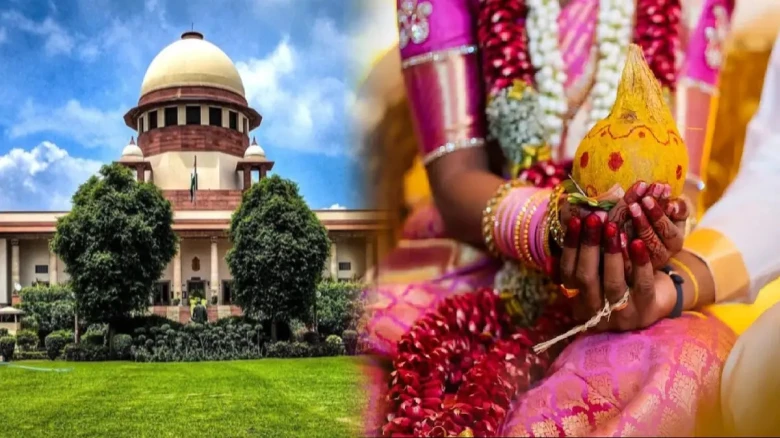Regional

The bench elucidated the significance of rituals such as 'saptapadi', symbolizing spiritual and emotional commitment...
Digital Desk: The Supreme Court, in a recent pronouncement, underscored the sanctity of Hindu marriage, emphasizing its intrinsic value as a 'samskara' and a sacrament within Indian society. The verdict, provided by a bench comprising Justices BV Nagarathna and Augustine George Masih, elucidated the fundamental principles governing Hindu matrimonial alliances and the imperative of adhering to prescribed rituals and ceremonies under the Hindu Marriage Act.
Central to the court's ruling was the assertion that a Hindu marriage transcends mere pomp and festivity, commercial transactions, or social formalities.
It represents a solemn and foundational event, establishing a sacred bond between two individuals who embrace the responsibilities of husband and wife within the framework of an evolving family unit. The court deplored the prevalent trend of disregarding traditional rites and ceremonies in favor of expedient arrangements, emphasizing the indispensable role of a valid marriage ceremony in conferring legal recognition to the union.
The bench elucidated the significance of rituals such as 'saptapadi', symbolizing the spiritual and emotional commitment between spouses, as outlined in ancient texts. It reiterated the principle of equality within marriage, rejecting notions of hierarchy or subjugation, and affirming the equal partnership between spouses as envisaged by Hindu scriptures.
Moreover, the court highlighted the legislative intent behind the Hindu Marriage Act of 1955, which aimed to codify and regulate matrimonial relationships among Hindus and related communities. The Act unequivocally endorsed monogamy while eschewing practices such as polygamy and polyandry, thereby delineating a uniform framework for Hindu marriages irrespective of regional or cultural variations.
Similarly, the court underscored the importance of compliance with statutory provisions, emphasizing that the mere issuance of a marriage certificate without adherence to prescribed ceremonies does not confer legal validity. It elucidated the distinction between registration and solemnization of marriage, affirming that registration alone does not establish the legitimacy of a marriage lacking conformity with statutory requirements.
In a decisive move, exercising its constitutional authority under Article 142, the court nullified the marriage certificate and divorce proceedings of the estranged couple, underscoring the paramountcy of adherence to legal formalities in matrimonial matters.
The Supreme Court's verdict reaffirms the sanctity and significance of Hindu marriage as a sacred institution, rooted in tradition and upheld by legal mandates. It serves as a clarion call for adherence to prescribed rituals and ceremonies, safeguarding the integrity and legitimacy of matrimonial alliances within Indian society.
Leave A Comment